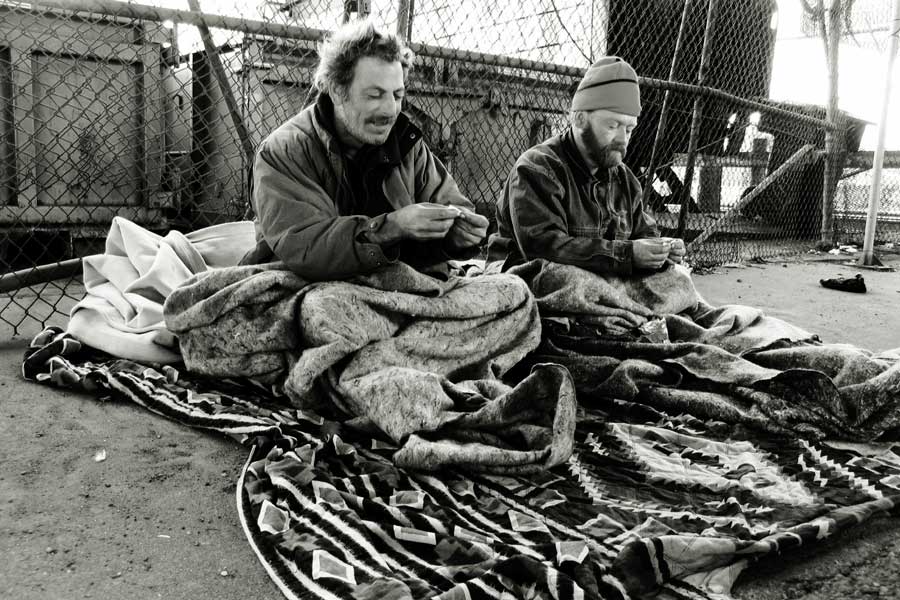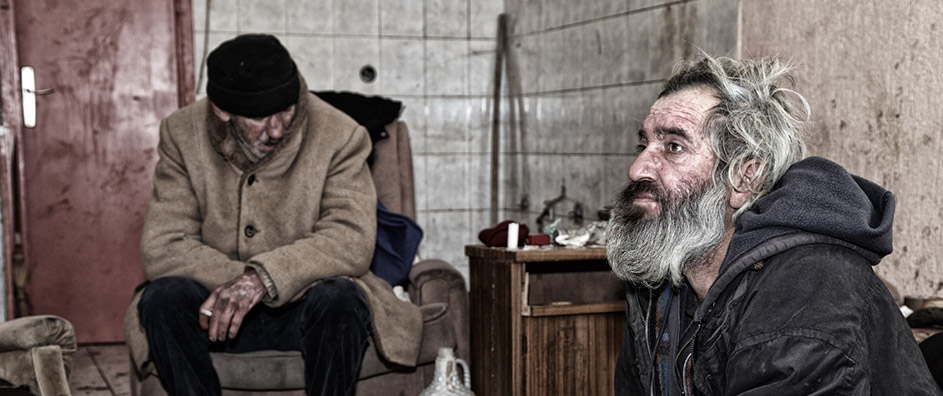The views expressed in our content reflect individual perspectives and do not represent the authoritative views of the Baha'i Faith.
Have ye heard the groan of the downtrodden, and have their cries of anguish reached your ears? – Baha’u’llah, from his tablet to the Times of London, in The Revelation of Baha’u’llah, by Adib Taherzadeh, Vol. 4, pp. 348-50.
A few years ago I had the privilege of helping to make a documentary film about homeless people on Skid Row in Los Angeles. Called Lost Angels the movie profiles eight poor and homeless men and women who literally lived on L.A.’s roughest streets. (You can watch on Hulu)
Lost Angels tells the story of those eight people and their abject, utter poverty in the world’s richest nation, chronicling their struggles and successes. It takes an unflinching look into the eyes and the lives of some of our poorest relatives in the human family. Most interestingly, it reveals the Skid Row homeless population as a close-knit community—a place where poor people find refuge, understanding and a life of meaning.
I learned a great deal making that movie.
I learned that living on the streets is a death sentence. The sentence may not be immediate, but it’s generally inevitable. When you have to face existence without any kind of shelter, your life can deteriorate very quickly. I met forty-year-olds who looked sixty; and fifty-year-olds who looked eighty. The National Coalition for the Homeless in the United States, after assembling a compendium of medical research studies, concluded that the average life expectancy in the homeless population is between 42 and 52 years, compared to 78 years in the general population. The U.K. homeless services agency Crisis says homeless people have an average life expectancy of 47, thirty years shorter than average. In Scotland, the average life expectancy of people who live on the streets is 39. In developing nations, where few services for the very poor even exist, those average life expectancies drop drastically.
I learned, on the other side of that coin, that homelessness itself does not have to become a death sentence. In fact, homelessness is only a temporary condition, which many people overcome. I learned that anyone can become homeless, that we’re all just a few paychecks or one unanticipated disaster away from losing our shelter.

I became convinced that if we all just pull together and unite our efforts, we can find ways to house homeless people. During the period of the making of Lost Angels, the organization I worked with—Homeless Healthcare Los Angeles—joined together with a non-profit affordable housing developer and built a 48-unit permanent supportive housing building (PSH) in Hollywood. Dedicated exclusively to the mentally ill and dual-diagnosis homeless population, that PSH building now houses a full complement of safe, securely-sheltered people in their own apartments; along with an array of social services like psychological counseling, health care providers, addiction treatment groups and social workers. Walking past that modern, attractive and well-landscaped building today, you wouldn’t recognize it as anything but another nice Los Angeles apartment complex—and yet it represents the future for people who never thought they could have one.
I learned, too, that the old attitude toward poverty and homelessness just doesn’t work. That attitude, which I heard more than once on Skid Row, usually goes like this: “Everyone is responsible for their own welfare, so get a job!” It suggests that homeless people should all bear the burden of their mental illnesses or addictions without any help from anyone else. It suggests that poor and homeless people are nothing more than human refuse; tramps, bums, derelicts, drifters, vagabonds, transients. It suggests that homeless people are lazy, that they lack any work ethic, that they intentionally avoid the demands and dictates of society and instead take advantage of it. It suggests that poor and homeless people are somehow less than human.
Nothing, I also learned, could be farther from the truth. If you met the homeless people I’ve met, you would see that they tend to have enormous difficulties in life, but often meet them with tremendous dignity and grace. Many grew up in households rife with abuse and brutality. Many encountered rampant parental abuse of drugs and alcohol when they were only infants or small children. Many of them suffered enormous, debilitating trauma in war. Many had their first schizophrenic breaks as teenagers or young adults, and could not function normally afterwards.
All of them faced these terrible things and tried to overcome them. But many couldn’t, and I wondered when I met them—could I? If these unbelievably horrible things had happened to me, how would I be able to survive them; and then live with them?
I ask myself those questions every time I meet a homeless person now. I try to look past their poverty and their situation and encounter each person as just another person, as my equal and my friend, as a spiritual relative. Then I simply listen. When I do that, I hear the most amazing stories.
I learned that not only from the documentary-making process, but mostly from the Baha’i teachings, which recommend befriending the poor and homeless, and then asking them to tell their stories:
If ye meet the abased or the down-trodden, turn not away disdainfully from them, for the King of Glory ever watcheth over them and surroundeth them with such tenderness as none can fathom except them that have suffered their wishes and desires to be merged in the Will of your Lord, the Gracious, the All-Wise. O ye rich ones of the earth! Flee not from the face of the poor that lieth in the dust, nay rather befriend him and suffer him to recount the tale of the woes with which God’s inscrutable Decree hath caused him to be afflicted. By the righteousness of God! Whilst ye consort with him, the Concourse on high will be looking upon you, will be interceding for you, will be extolling your names and glorifying your action. – Baha’u’llah, Gleanings from the Writings of Baha’u’llah, pp. 314-315.
If you watch the film, you’ll see what I mean. If you combine that experience with immersing yourself in the Baha’i teachings on the subject of alleviating poverty and homelessness, you’ll most likely be moved to want to take action and do something. In the next essay in this series, let’s talk about how to frame the issue and think about it in a new way.
Next: The Palaces of the Rich, the Comfortable Cottages of the Poor
















Comments
Sign in or create an account
Continue with Googleor